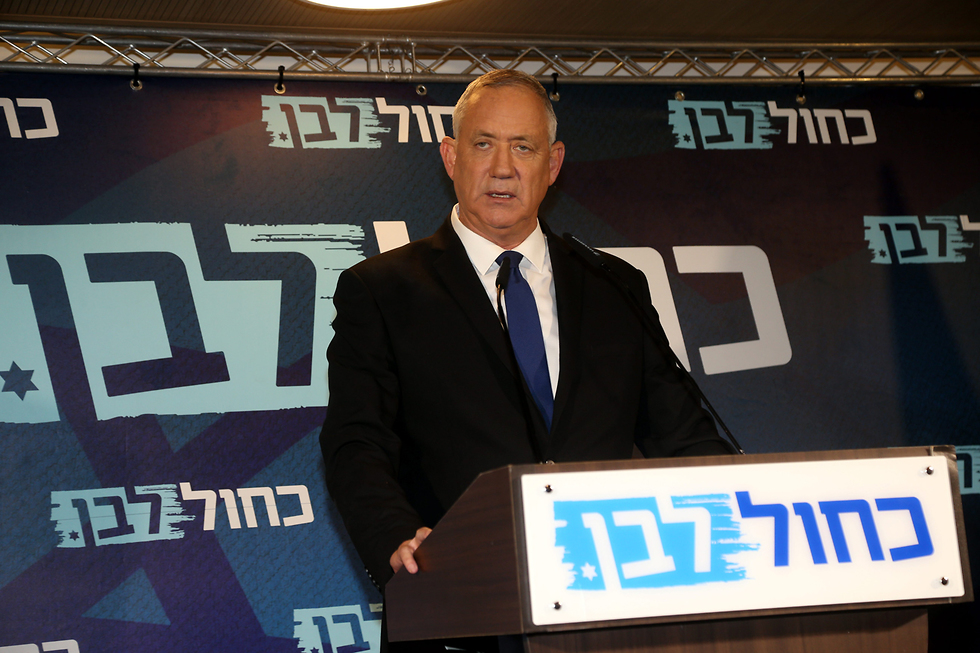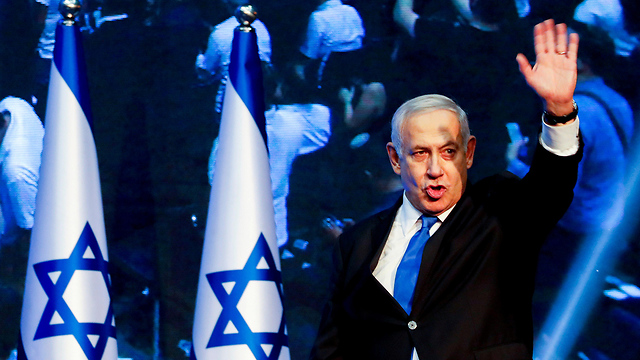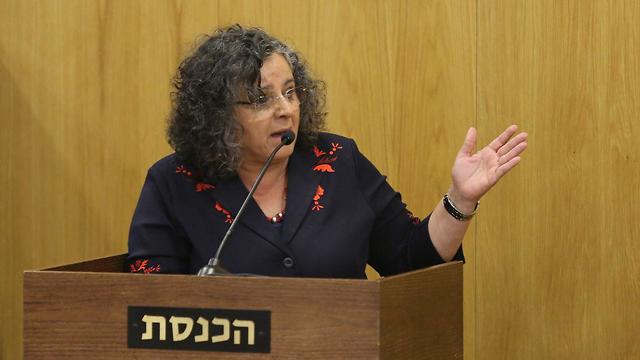
When the chosen people can't choose
While rumors swirled on election night about a group of acting Likud MKs preparing a rebellion against the prime minister, none of the potential heirs have shown any willingness to stand up to Netanyahu
Leader of Israel’s Blue and White party Benny Gantz on Thursday rejected a proposal by incumbent Prime Minister Benjamin Netanyahu, in which the head of the Likud Party, the putative second-place finisher, had offered to form a unity government on condition that three right-wing parties in his bloc be included in the coalition.
As the leader of the new largest party in Israel, Gantz dismissed the offer as being premature and not serious.
The latest turn of events followed two tiring days since the September 17 election.
At 22:00, when the exit polls were beginning to be revealed, Netanyahu was watching the results from his residence, surrounded only by his closest family members.
Meanwhile, thousands of his supporters had gathered at the Tel-Aviv Expo convention center waving Israeli and American flags. The crowds were chanting the familiar Likud slogans: "Bibi is the king of Israel,” using Netanyahu’s nickname, and “We don't want unity,” denouncing the very possibility of the joint government that Netanyahu proposed less than two days later.
Despite the throngs of supporters at the Likud gathering, something - or rather someone - was missing: the leader of Likud.
It was not until 3 a.m. when he finally showed up and greeted his supporters. The most powerful man in Israel, a man of a "different league" as his campaign implied, looked exhausted. After leading the country through its second election in just six months, handling another vicious campaign by exploiting every possible political trick, the numbers showed he would still not be able to form a right-wing government.
In just two weeks, Netanyahu, the longest-serving Israeli prime minister, will face a pre-indictment hearing. By the end of this year Attorney-General Avichai Mandelblit is expected to issue his final decision on the prosecution of three legal cases against him.
If Netanyahu is able to form a government, he could face the trial as acting prime minister, and even attempt to legislate an immunity bill.
But this scenario seems hardly to be in his cards. The results show that Netanyahu is 3-4 mandates short of the 61 seats in Knesset needed to form a majority government bloc.
This major political obstacle could imply a possibility of an indictment and even jail time. It could also mean that Israel is heading towards a new, post-Netanyahu era.
On the day after the elections, Israeli citizens woke up with mixed feelings.
The voter turnout was high and the election process wasn't marred by violence, as many had expected. However, even after casting their ballots for the second time this year, the country still did not know the identity of its next prime minister.
The September results were quite similar to those of the April election.
The Blue and White Party now holds 33 seats while the Likud holds 31 - but neither of these parties are able to form the coalition by reaching the necessary 61-seat minimum.
The Joint Arab List, which is a combination of four Arab parties ranging from nationalists to Islamists, earned 13 seats, while two left-wing parties – Labor-Gesher and the Democratic Union (which includes the venerable far left Meretz) – ended up with six and five mandates, respectively. Yisrael Beytenu enlarged its presence in the Knesset, going from having five seats to eight, thus becoming a kingmaker or king-breaker all over again.
Despite results that more or less resemble the ones from the previous election, Professor Dany Filk, who heads the department of Politics and Government at Ben-Gurion University, believes that there is still a significant change since the results in April.
“We are now dealing with two types of right-wing (parties) in Israel,” Filk told The Media Line. Using the nickname by which the incumbent prime minister is universally known, he explained that “One is pro-Bibi, and the other one - Avigdor Liberman - is anti-Bibi. This time the pro-Bibi right-wing (bloc) lost six seats. It is very significant.”
Filk said that he believes that Netanyahu’s campaign - that included pushing to install video cameras in Arab polling stations and to warn Israelis that voting for Gantz may lead to Arab parties joining the government - had not succeeded.
“First, the Arab voters showed up at the polling stations despite the threats and incitement against them,” Filk says.
And secondly, “perhaps, some of the would-be supporters of the Likud were deterred by the possibility of a government that is solely dependent on the ultra-Orthodox (parties). So some of these votes went to Liberman.”
Meanwhile, he believes that the results that were achieved by the left-wing are the best possible results in this situation.
“I think that one shouldn't expect significant changes in such a short time,” he says. “Also, there were no dramatic events that could cause a shift within the voters – no economic or security crisis. In the future, if the political actors - specifically on the left - will not change their strategy, they will end up with the same results.”
The idea of Likud joining a government with Blue and White, headed by Gantz and Yair Lapid, had initially been suggested by Netanyahu nemesis Avigdor Liberman, who chairs the Yisrael Beytenu party.
For now, though, it's still not clear who will blink first. In a parallel reality, the Likud and the Blue and White, the two largest parties who now share 65 seats, could immediately form a unity government with Liberman, or even without him.
The only problem with this scenario is that the Blue and White leaders refuse to sit with Netanyahu while an indictment hangs overhead. Therefore, Netanyahu's call for unity “with no preconditions” is perceived by Blue and White as pressure exerted on Gantz to proceed with coalition talks and allowing a lifeline for Netanyahu.
For now, no Likud Knesset member or minister expressed support for replacing Netanyahu with another member of the party. On Wednesday night, all right-wing and ultra-Orthodox parties signed a pact to prevent any of them from acting individually.
Eli Cohen, a former member of the Kulanu party who joined the Likud recently and now acts as the minister of the economy, believes that there could be no government without his party.
“The other side can form a government only if Liberman will sit with Ayman Odeh, the head of the Arab Joint List,” Cohen said, a move that is unlikely due to Liberman’s history of strongly anti-Arab beliefs and policies. “Likud stands firmly behind its leader – Benjamin Netanyahu. The Zionist right-wing in Israel is significantly stronger than the Zionist left-wing, so I suggest that the left-wing will hold it with the celebrations."
Many Likud MKs expressed similar messages immediately after the first polls were revealed with their interviews and Facebook posts sounding surprisingly identical. MK Osnat Mark, who was number 35 in the Likud list and will not serve in the Knesset wrote that “one thing is clear today – Benjamin Netanyahu is the next prime minister.” More senior figures, however, were much subtler or remained silent.
While rumors swirled on election night about a group of acting Likud MKs preparing a rebellion against the prime minister, none of the potential heirs – Foreign Affairs Minister Israel Katz, MK Gideon Saar or Knesset Speaker Yuli Edelstein – have shown any willingness to stand up to Netanyahu.
"Maariv" columnist and political analyst Dr. Revital Amiran believes that the top Likud members will eventually need to act to get rid of Netanyahu.
"How long will they stick with Bibi, if he will not be able to form the coalition again?” Amiran asks, in an interview with The Media Line. “Despite the loyalty to the leader, which is a part of this party's DNA, they will have to act so that they will not find their party in the opposition, or in another deadlock.”
“The rumors about the possible rebellion came from many directions – Liberman, Blue and White, and the left,” he explained. “At the end of the day they will probably get there."
Seemingly foreseeing this scenario a few weeks ago, Netanyahu made all Likud MKs - senior and junior - sign a loyalty pledge that ensured that they will not make any decisions without a consensus in the party. All of them signed without a word of criticism.
Just five months ago, before the April elections, some Israeli political commentators estimated that Avigdor Liberman, who resigned from his position as defense minister in November, was finished. His supporters - mostly elderly immigrants from the former Soviet Union - were diminishing and by April 9, Liberman only managed to secure five seats in the government.
In the last five months, however, he managed to restore his reputation, enlarge his presence in the Knesset and position himself as the ultimate kingmaker.
Will the person who was part of Netanyahu’s closest circles for many years lead to his demise?
During his speech following the exit polls, Liberman stressed again that he only wants a wide unity government, consisting of Likud and Blue and White and excluding the ultra-Orthodox parties, the Joint Arab List, and the far-right-wing parties. He did not mention any desire to ensure that Netanyahu not lead the government.
“I would be happy to stay in the opposition, as long as there is a unity government,” said Liberman, projecting an image of a mature and wise statesman, ready to sacrifice his own interests for the sake of his country. Unlike Netanyahu, he looked relaxed and satisfied.
Yet, while Liberman’s latest image may look statesman-like, many Israelis are still doubtful that the politician, who became infamous for radical ideas like transferring control over Israeli-Arab cities to the Palestinian Authority, had accomplished his transformation into a strong and confident mainstream politician.
"It is unbelievable that Liberman, who is perhaps the most dubious Israeli politician, has gained full legitimation from the Israeli public,” former leader of the left-wing Meretz Party leader, Zahava Galon, said. “He speaks about ‘the people’ wanting a unity government, but this is a sham. Half of Israelis voted for the right-wing and for Bibi, and the other half voted against. The only thing that Liberman wants is to become the leader of Likud in the future, when Netanyahu will be long gone."
Yisrael Beytenu supporters, who mainly come from the Russian-speaking community, seem to be quite satisfied with the election results.
Svetlana Dornizky from Ashdod believes that Liberman will not cave into Likud pressure and will not join a government that includes ultra-Orthodox parties.
“Unity is the best choice for our nation right now,” she said
“I personally support the right-wing and do not trust the ‘generals’ very much,” she says, referring to the three former IDF generals who lead Blue and White Party. “But we'll have to live with that. Otherwise the ultra-Orthodox will drag us into the Middle Ages.”
Professor Zeev Hanin, a political science lecturer at Ariel University and an expert in Russian-speaking Jewry in Israel who has also served as the chief scientist at the Immigration and Absorption Ministry, says he was hardly surprised by the results.
"The campaign of Likud designed for ‘Russian’ Israelis failed miserably,” he says. “They were unable to sway the voters from Liberman to Likud, so Israel Beytenu gained approximately 5.5 seats from this community, while Likud had gained the usual – about 3 seats. However, this time around also many native-born Israelis in the central part of Israel cast their vote for Liberman, many – for the first time in their lives.”
“It seems that by voicing a concern that the ultra-Orthodox parties will change Israel for good, he pushed all the right triggers with the secular Israeli society, despite the fact that we have been fighting the very same issues for years," Labor MK Merav Michaeli told The Media Line.
"And now it suddenly matters only because a right-wing politician decided to raise this issue," she said.
Not only Liberman, but Odeh was also grinning following the exit poll results. The leader of the Joint Arab List enjoyed the relatively high voter turnout of Israeli Arab citizens. While in April their turnout was only 48%, in September 61% of eligible Arab voters - who account up to a fifth of Israel's population - cast ballots, almost a record high.
Arab Joint List MK Aida Tuma Suleiman says that the Arab citizens felt the importance of the time and decided not to shun the elections.
“Our people felt the danger, the tough battle for our mere existence,” she said.
“They trusted the members of the Arab Joint List, that was now reunited, and decided to take their fate into their own hands.”
The former head of the Knesset Committee for Women Affairs, Suleiman has no illusions about the future government, even if Liberman's call for a unity government will be answered and does not believe that her party will be able to join any government.
"I don't think that anybody really thought that we will be in the coalition,” she says. “Gantz can't form a narrow government, and he needs the unity government just as well because he is not ready to make any political compromise and he doesn't want to pay the price needed for peace. I believe that we will serve our duty well as opposition."
If the unity government suggested by Liberman is formed, it could mean that the Joint Arab List will lead the opposition as its largest party, and its leader, Ayman Odeh, will be briefed by the prime minister on security affairs. This possibility has already caused an uproar with the right-wing, although the opposition and the coalition are yet to be formed.
Netanyahu's call for unity with the man he made a point to ridicule during the last few months does not necessarily mean that this miserable ordeal is close to reaching its end.
The results also leave a question mark on the validity of the current Israel electoral system that currently allows parties to gain access to the Knesset with just four seats. The electoral barrier had been raised in recent years by none other than Liberman, but it still allows for small and medium-size parties to execute their will on the two largest parties, which have gained the support of over a million Israeli citizens each.
As for the prospect of a unity government, while that might be eventually formed if Netanyahu will step down or if Gantz will accept his proposal, it's hard to envisage that such a government will last long-term or be stable. All three actors - Likud, Blue and White and Yisrael Beytenu - have different ideas regarding state governance, foreign policy, and domestic issues.
The hawkish wing of the Likud will resume the talk on annexation, while the more dovish Blue and White, which received support from traditional Labor Party voters, will have to resist these moves, while also maintaining their center-right status.
Liberman, who during his 20 years in politics wasn't able to promote the state and religion issues such as civil marriages or public transportation on Saturday, will push hard for legislation in this sphere, probably facing on opposition from the traditional wing of the Likud party.
Thus, the unity government that for now enjoys the broad support of the Israeli public may also become a dysfunctional and impotent one.
The current timetable suggests that in just one week the president will have to make his choice - one of the most difficult he's ever made. Then the chosen one - or ones - will have 28 days to form a government, and if he or they will not succeed - they can have another 14 days.
If after that a government has still not been formed, the president might designate another MK for this truly Sisyphean task.
And, with the Jewish holidays occurring throughout this timetable, Israel will likely continue living in this post-elections confusion for at least the next two months.
Article written by Ksenia Svetlova Reprinted with permission from
The Media Line















